Unless you’ve gone to a college in the last 10-15 years (and only when the book existed), you may not even know where the name Facebook came from. (In case you want to know, here’s a hint.) Facebook, originally known as thefacebook.com, was a service that connected college students to their classmates and to friends in other universities. The concept was based off a tangible book that incoming freshmen were given each year so that they can meet their classmates. Because of its original simple use (communication!) and its restricted access, people had no need to use any other names on the Mark Zuckerberg-created social network. You could find me by searching for my name (my maiden name, at least). You could find any college student who elected to join by using their first name and last name. They weren’t trying to be silly and they had no reason to self-promote. It was a closed service with almost instant and immediate trust.
It’s how social networks are intended to be used.
I’ve briefly touched upon a huge pet peeve of mine in my social media etiquette handbook, saying that you should use your real name and not represent anyone (or anything) else. If you do so on Facebook, your account will likely be terminated especially if Facebook receives reports of misrepresentation. Case in point: in 2006, Facebook removed the only Facebook friend I had who wasn’t a real person. That person was St. Augustine of Hippo, who has been dead for nearly 1500 years. Since Facebook wants you to use your real name and to be yourself, I totally understand and respected their decision to remove the account.
By removing this account, and I’d imagine dozens of others, Facebook set an example, but four years later, name abuse is running rampant on the service. Since Facebook’s user base is so big, and since their staff is clearly too small, they are unable to police this infraction as effectively as they used to. It’s a shame since some of us “purists” (if you will) are bothered by the lack of respect these individuals give to Facebook’s rules themselves, and most importantly, their peers.
Here’s my request of these individuals: Use your real name. Only your name. Don’t be ridiculous and start adding qualifiers (like Seo unless it’s part of your name). Facebook is a great tool for marketing your business, but only if you use it correctly. Sorry, there are eleventy billion SEOs on Facebook. There are probably many web consultants. These terms do not belong in your first name or last name. If you want to promote your business services in some capacity, use a Facebook Fan page.
Because it is still unclear to a large (unfortunately) percentage of people how to use Facebook, I’ve taken the liberty to explain what the different Facebook profile options are that are available to you. Don’t need this? Pass it onto the people who do. Maybe they sent you a Facebook friend request and you were too uncomfortable accepting it because of the strange associations implied when a person said he’s a pizzeria.
Profile Page: This is simple stuff, guys. You create a brand new account on Facebook. You enter in your birthday (yes, your birthday. The one on your birth certificate). You tell people about the schools you’ve attended, the degrees you’ve earned, the interests you may have. That’s for you, the person reading this. You shouldn’t create it for your dog or your 3 month old son (as much as I want to for my own child, I assume that in 13 years or so, if Facebook is still around, he’ll want to create his own account with a real birthday). This account is for you. If you already have an account, don’t create another one. This is a personal profile for a reason.
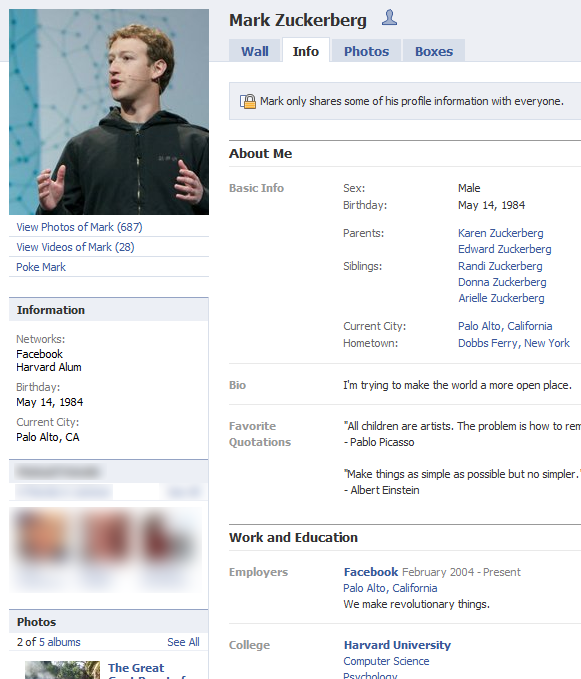
Facebook makes the bold claim that they have 400 million accounts, which is a great number to a potential advertiser or business looking to jump on the bandwagon. Truth be told, that may even be why Facebook has stopped canning abusive accounts. However, that number simply isn’t accurate because most Facebook users don’t follow the rules. Still, it puts Facebook ahead of MySpace.
Official Fan Page: Are you the owner of Gary’s Ice Cream on Main Street? Do you represent Sylvester’s Soccer Shop down the block? Excellent. You’re authorized to create a Facebook Page. This is a page you can use that is publicly available (for the world to see and find via search engines) to help your customers find you. It’s the greatest thing for you as a business owner; you need not go out and start befriending people to let them know you exist — once you create the page, just tell your customers about it, and the word of mouth will spread.
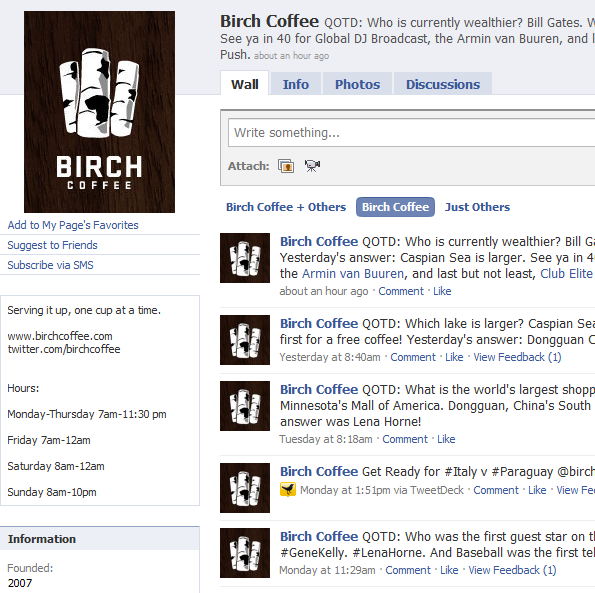
Community Page: What if you love something but you have no direct affiliation with the product/service, can’t find the official page, and worse, discover the page doesn’t even exist? Community Pages are the most annoying thing Facebook has given us, but I see their point. In an effort to make Facebook data more public, Community Pages let people share ideas, thoughts, and their interests in a fully open forum. Sadly enough, most people don’t know that their content is public; a wonderful example is seen below. Did anyone know that this was going to be made public? Of course not.
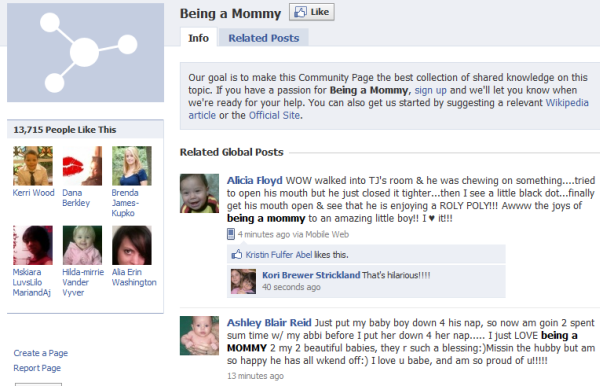
Groups: Facebook Groups still exist, but I wouldn’t encourage using them unless you’re looking to maintain a fully closed and private community in the confines of the service. Normally, Groups exist to let people congregate around a common interest. Maybe you went to the same summer camp in 1992 and want to share photos with your old camp mates. If that summer camp doesn’t exist anymore, a Facebook Group may make sense. (And if it does still exist, a Facebook Page may make sense.) There’s a lot of overlap between Facebook Groups and Fan Pages, but Facebook Groups is very limited in terms of functionality (Facebook has had Groups since the beginning of time).
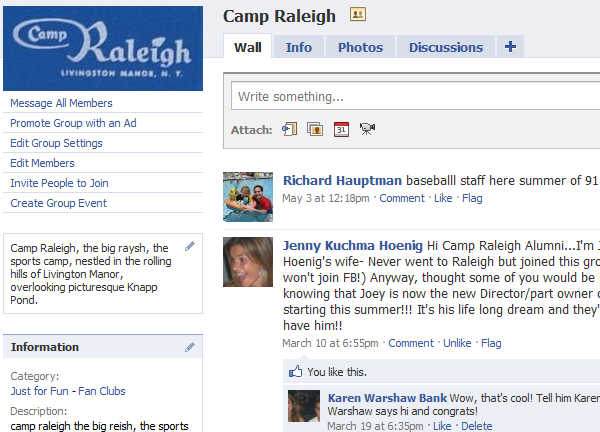
There you have it: personal profiles versus Fan Pages versus Community Pages versus Facebook Groups. And perhaps, now you know a little more of how each “community” on Facebook is intended to be used. Heck, most of you get it. But in the last few days, I’ve run into:
- One of my favorite new restaurants using a regular Facebook profile, which I only learned about because it showed up in the box of 6 friends on one of my friend’s profiles. Restaurants aren’t things I feel comfortable being friends with. They’re things I Like. On principle, I just cannot add this restaurant as a friend. It’s just awkward.
- A religious institution using a personal profile which uses default privacy to broadcast information about its offerings. Too bad it’s not public; nobody can actually see these updates unless they actually are your friends.
- A local photographer who not only has a Facebook account which totally is named after her business, but she also watermarks every single photograph she uploads to her Facebook album. It’s overkill.
- Contributions on a Facebook event wall that come from a social media aficionado whose name clearly isn’t on his (her?) birth certificate. Even social media “purists” aren’t really that pure.
Okay, yeah, perhaps these minor details aren’t the end of the world for some people, but when I’m friends with real people with real names, having a friend who looks like the odd one out just seems wrong and exploitative. (Yes, exploitative: “Facebook hasn’t stopped me yet so I’m going to sell my services as overtly as possible in my username. Maybe a friend of a friend will need me one day.”) Yet, over the past few months, I’ve been befriended by some “www dot domain dot com” types and refused on principle, but I realized that so many of my friends who do not even know them are accepting the requests blindly simply because there are other mutual friends, not because they agree with this tactic. Hold your moral ground! 🙂
What Facebook needs is a way to convert profiles — full fledged ones that include “religious affiliations,” “marital status,” and the like — to Fan Pages. People who have already established a fan base on their personal profiles don’t want to start anew. But in the absence of that, for now at least, it’s advisable to change your name where you can or just create that Fan Page. You wouldn’t want the months or years of work you’ve invested to disappear into thin air one day because your account got terminated due to abuse of policies.


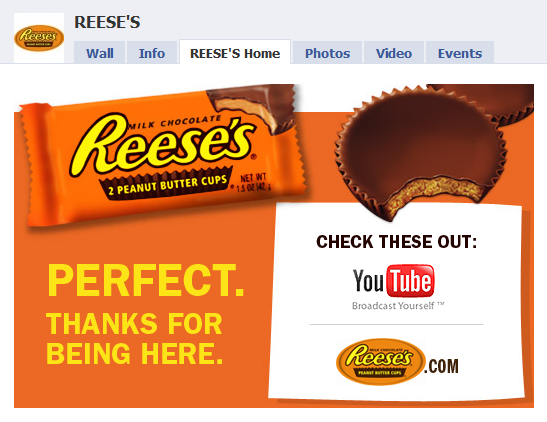

Thanks for the post Tamar. I can completely relate. Just a few weeks ago, I received a friend request from the owner of the gym I am a member of (it’s a small gym, so everyone knows the owner). I didn’t think twice before approving him, since I knew he already created a fan page to the gym itself and I just though he had recently opened a Facebook account and started befriending people, however, I soon realized, that he wasn’t behind this account, he simply got some pro to register in his name in order to promote his business, so I removed that account from being a friend of mine.
This is just one occasion, on a daily basis, I see business friends of mine use their personal accounts as publishing mechanisms at a rate of around 95% of their posts, while they do have their own fan pages just for that purpose. It can be very annoying. What’s worse, is that after sitting down in several meetups of social consultants, I realized that they guide their crowds to do exactly that, use personal accounts as core business accounts, or rather, not explain about what is wrong with doing that in most cases.
Oh yes. I totally agree. If you have a Facebook Page, you don’t need a profile also.
Facebook claiming a membership of more than 400 million is bunk. Maybe they have 200. Maybe 300. Not 400.
I really want to befriend some of these institutions, but not if they can’t run with Pages instead. It’s a bummer.
One more thing I remembered is that a long time ago, when I just started using Facebook, I played a game called “Friends for sale”. Back then I realized that for every person playing that game, there were about a 100 fake accounts created for the sole purpose of cheating in this game. That gives me a feeling that Facebook doesn’t have 200, maybe 300 million members, but way less. Then again, I have no clue how they make their count, maybe if they decide to go public, we’ll know more.
That’d be interesting to see. Facebook *has* hit more than 100 million uniques, so I’m guessing their real membership number hovers around 200 million.
Portland has 2 hookah lounges w/ profile pages that are “in a relationship” with each other…of course, we’re pretty weird out here :.)
Can’t agree more about being able to convert pages from one type to another…even they must acknowledge that people aren’t always making the optimum choice.
And you must be friends with them both. 🙂
You make an excellent point Tamar. Especially with the “SEO”, “www dot something dot com” types. It’s so annoying and it shows they are real failures at what they do.
I mean, if they are SEO experts, why are they not bringing in search engine traffic? Why do they need to be unethical on Facebook?
This practise shows how unethical and unsuccessful they are. I just wish people will be smart enough to steer away from such people.
The problem with these types is that they realize that most people use Facebook to communicate with friends about personal things. The communications aren’t business focused. You want to be “SEO?” Use LinkedIn. That’s a much more professional medium. You can be “SEO” or “Bob Smith 50000+ Connections” there all you want.
I don’t know if it’s a question of them not being ethical, but perhaps they might be (at least in terms of having “Seo” in their name for client acquisition). On the other hand, people also have “Seo” in their name so that they could make new friends with similar interests.
Newsflash: you can also do that by befriending someone and including a message introducing yourself. Therefore, you’re not forced to add Seo in your name.
Tamar, I agree with you to some extent. Yes, LinkedIn is a more professional medium but I still think adding “SEO” to your name is annoying. If people want to show other people that they like SEO, they could join an SEO group on LinkedIn or Facebook or start their own.
Putting your real name forward is the best way to earn trust and qualified leads. Besides, what if there was no online platform to network? Before social networks existed, I am sure people will not introduce themselves as “Andrew Expert Chef” or “Valentines Day Gifts”.
‘Real’ Introductions are more acceptable. Thanks for adding that Tamar.
I don’t disagree that adding “SEO” to your name is annoying, Kwame. However, I’d MUCH rather see that on LinkedIn than Facebook.
Okay, I get your point now, Tamar.
LinkedIn- professional networking. Facebook- mostly personal interactions.
I failed to figure out what you meant the first time.
All good 😀 I actually have a great post on how I use the services. Everyone is different though.
Social media sites have evolved (and will continue to evolve) so it’s hard to say if they’ve done something wrong. Although Facebook’s initial creation was more closed. Zuckerberg aims to create a more open onlne world…whether we like it or not. I do think people have abused the system and many have lost credibility. Good post.
Hey Kyle, thanks for stopping by.
In their minds, sure, they may not have done something wrong. But then again, Facebook itself has Terms of Service, and they have violated these guidelines. That’s the key point.
If it were allowed, sure, I wouldn’t be wasting my time with this post. I’d question their name choices and still think it’s sleazy for “www moron dot com” to befriend me, but this post would have no place.
I think users are at fault here, but so is Facebook. Its page layout is dead simple (and used to be even simpler) but there’s no clear distinction between Groups, Fan Pages, and Community Pages. Hopefully this post helps a bit as the information can be found in one single location.
This is really spot on.
I’ve always believe Facebook should be used as a communications tool because, durr, that’s what it is.
It’s great that Facebook has made the push to include groups, fan pages and other items for those that do want to use it for marketing but when you’re setting up your page (just as you said) go personal.
Yeah. It really bugs me. The more I see more people doing it, the more annoyed I get. Thanks for commenting, Murlu. 🙂
LOVE this post. I feel like I say these same things over and over and over again on my webinars and still people don’t listen, or maybe they hear the words but it’s all “Greek.” Everytime a business sends me a friend request I kindly send them a message prior to clicking “ignore” to let them know that having a business on the personal profile platform is against FB’s TOS and I strongly encourage them to consider a business page instead so they don’t lose all of their hard work if FB ever swoops in and deactivates their account without warning. I even go so far as to send them a guide I created for setting up a FB business page and let them know if they make this change now they can work on converting their “friends” to “likers” while they still have that opportunity. I continue on to tell them that in addition to these reasons, by being on the personal profile platform, they aren’t receiving the SEO benefits afforded to business pages; ie page statuses being indexed by Google while profile statuses are not. And in case all of that isn’t convincing enough I “warn” them that they are losing out on the “following” of folks like you and I who do not wish to be a “friend” of a business and subsequently open up our personal profile to them; suggesting they could potentially generate a larger fan base with people only having to “like” their business and not “befriend” it to receive updates. I realize I’m preaching to the choir here and again I thank you for trying to get this message out to more folks – my long-winded point I’m making here is that I like to think that the majority of businesses that set themselves up on personal profiles do so due to lack of knowledge not because they are wanting to violate TOS or be sneaky; because if they really knew anything about it, considering the reasons mentioned above, they are only hurting themselves by not doing it “right”.
Hi AK, thanks so much. You’re so incredibly right — every single point.
Companies are clearly clueless, but once educated, they refuse to conform. For the favorite restaurant, I messaged them letting them know. They ignored me, and I then followed up again, which they appreciated with an acknowledgment. But did they listen? No.
See item 12 in the Social Network Users’ Bill of Rights:
1. Honesty: Honor your privacy policy and terms of service.
2. Clarity: Make sure that policies, terms of service, and settings are easy to find and understand.
3. Freedom of speech: Do not delete or modify my data without a clear policy and justification.
4. Empowerment: Support assistive technologies and universal accessibility.
5. Self-protection: Support privacy-enhancing technologies.
6. Data minimization: Minimize the information I am required to provide and share with others.
7. Control: Let me control my data, and don’t facilitate sharing it unless I agree first.
8. Predictability: Obtain my prior consent before significantly changing who can see my data.
9. Data portability: Make it easy for me to obtain a copy of my data.
10. Protection: Treat my data as securely as your own confidential data unless I choose to share it, and notify me if it is compromised.
11. Right to know: Show me how you are using my data and allow me to see who and what has access to it.
12. Right to self-define: Let me create more than one identity and use pseudonyms. Do not link them without my permission.
13. Right to appeal: Allow me to appeal punitive actions.
14. Right to withdraw: Allow me to delete my account, and remove my data.
Facebook collects more data voluntarily from users than banks do, often information that can be used for Identity Theft. So until Facebook starts taking such a fiduciary trust seriously, I’ll keep my account deleted.
Meanwhile, I will continue to use my real name online ONLY where I am a paying customer. Twitter can have my business instead.
The real name thing is actually a policy on Techipedia. Since you probably don’t respond to MacSmiley in real life, and since I want these to be personable interactions, I do ask of that at the minimum. It doesn’t have to be your full name but a first name is requested. Based on your email address and Twitter info, your name is shared by millions of people so I don’t see why you couldn’t do so here.
Anyway — when it comes to Facebook, point #1 is definitely a huge conflict with #12. And while I respect your Bill of Rights, I greatly admire most that you have elected to delete your Facebook account rather than create a strange account under MacSmiley.
Feel free to delete the duplicate. Thanks.
Already done. 😉
Becoming friends with companies is just creepy but as you say lots of people don’t seem to mind. There seem to be a large number of bars & clubs who are now friends of my friends… Please stop it & start reporting them! Awkward…
I’m actually not comfortable reporting them myself. My well-known philosophy is that I’m all about business empowerment. These are businesses trying (albeit the improper way) to make an online identity for themselves.
My biggest issue with businesses using personal pages is that if you friend them, they have access to your information. I know I can customize my settings, but I’d rather just keep it to friends and family – as friendly as I am with pizza.
Interesting comment, Susan. On Tuesday, I was having a chat with a colleague of mine who I’ve known since I was 10 who is in a similar industry. He actually WANTS restaurants to know as much as possible about him so that they can give him stellar service.
He told me this: “I go to the same restaurant every day. I’m comfortable going to this one place every single day for lunch and I’ll do it for two, three years. If for whatever reason, I end up going to another restaurant, I want them to know how loyal I am to their competition across the street so that they can try to win my patronage as regularly as the first one did.” And he wants that kind of technology in a foursquare type of app.
Wouldn’t you love it if restaurants knew more about you (whatever’s important) so that they can give you the best possible support? That’s what Social CRM systems are trying to solve.
what ever happened to that beautiful feature which allowed us to convert groups to pages? i wish it still existed! 🙂 i still cannot fully understand why groups are still around… but thanks for the explanation.
Did it ever exist?
And I totally agree with you about Facebook Groups. I mentioned it because apparently companies still care about them, mostly because they can be closed and available by invitation only. Of course, such a thing would never help your search engine traffic…
Great post! If people just knew how wrong personal profiles for business owners are, and started to report them to Facebook- problem solved.
And there’s already a kind of simple way to convert the fan base from personal profile to fan page, I think. Just invite all the “friends” to join the new page. A lot of them won’t – but that’s the ones that weren’t really interested in the first place.
Right Markus, I know that there’s a way to do it. However, it’s much more work on behalf of the users. There should be a more automatic process that converts these friends to fans. People simply *won’t* do it because they do not want to lose their friends in the conversion process when their friends elect not to Like the entity in two places (or at all anymore!)
The process is risky. A more automatic process is what I’ve been proposing.
You’re probably right. There should be an easier way. Or maybe developers should improve the possibilities with pages more, so profiles becomes less atractive to use.
Well we all think that facebook is a social site but thats no true vcz e all know that facebook is controlled by cia and every bit of you information is stored in the facebook so we guys so be more carefull of wht we are doing
Um, thanks. I guess I’ll let this comment spam slide.
Here here Tamar. I’ve noticed more and more items popping up in my news feed recently informing me that several of my friends are now friends with their local pub or a nearby recording studio.
One thing that’s become clear to me from conversations I’ve had with a few small business owners is that there’s this common misconception that they have to pay to be able to set up a Facebook Page for their business so that’s why they’re “cheating the system” by creating standard profiles in their business’ name. The biggest problem is that most of these businesses are too small to be able to justify the expense of hiring a consultant to help them set up the online marketing profiles correctly and by doing things themselves (and doing them the wrong way to boot) they’re not actually doing anything to help build their business.
I think there’s potentially a nice little niche forming for local consultants to offer an inexpensive service to set up a proper Business Page and provide business owners with a brief tutorial and ebook on how to manage and promote their fanpage.
As to your other point about individuals using their professions in the personal profile names, I fully agree that their missing the point of what Facebook is supposed to be about but I’m not quite at the zero tolerance stance that you’ve taken (not yet anyway, but if I get many more requests from Dick “Day Trader” Donaldson and the like, that may change). The only exception I’ve allowed so far is for a fairly well known UK-based SEO who I’ve interacted with on Twitter and other sites in the past, so I’ve been willing to overlook the fact that I know his last name isn’t really SEO.
Ken, take a look at the link in the article for “Seo.” You and I are talking about the same person. And take a look at the comments. I mentioned that I befriended Dan and unfriended him because the “Seo” as his surname felt creepy. He re-befriended me many months later and I just couldn’t do it. Either way, you already know my stance — I like to meet people in real life before I connect with them on Facebook, since my Facebook profile is a personal profile.
As for the little niche, yes, consultants already do that. They should just use this page as a guide. 🙂
I’m starting to come round to your way of thinking on this. As far as the Dan situation goes I think we’ve had almost no interaction since I accepted his friend request and although I enjoyed following the saga of his recent hacking problems via his FB updates, there’s precious little value to be had from our being friends on there. My mouse pointer has been hovering ever closer to the Remove Friend button for a while, probably a little more so after reading this.
What bothers me more than having friends in the industry, who are there mainly for the sake of filling out the numbers and on the very slim off-chance that we may need to contact each other, are the users who never actually go near Facebook after the first couple of days that they spent setting up their profile, firing off friend requests and activating the necessary automation to publish their every tweet and blog post as new status updates, which of course they never reply to any comments on because they’re having that conversation on Twitter.
My other big bugbear is with the one or two users who send me several invites every week to join their business’ various pages or to attend their events on the other side of the world. If they’re so clearly intent on spamming their own contacts in this way what sort of heavy-handed tactics must they be advocating for their clients?
My problem is that I know who Dan is. He doesn’t have to add “Seo” to his name to get my attention. In my eyes, people doing so really do it to get new clients. However, I suspect Dan is doing it because he wants people to know who he is. He really doesn’t need to prove himself to anyone! He has a pretty strong identity in the industry.
And WOW, you’re spot on with your last comment. I had to unfriend a friend who sent me 12 requests in about 2 minutes. Yes, really. Sadly, I know the guy in real life. He’s a nice guy too. But he’s not a Facebook friend; he’s a spammer. I can only imagine how badly these individuals behave when it comes to client promotion….
You are simply brilliant.
Edited: Gee, thanks. But your comment violated my blog policy, Mr. Vantage.
Hi Tamar,
Excellent post. I shed a few tears while reading it.
I usually turn down any friend request that comes from a business name or from someone I don’t know, who hasn’t included a personal message with his request.
I find it extremely odd how Facebook users (or users of any other social network, actually) can find it so intimidating to use their own names. What’s up with that? What could possibly happen if people find you online and connect with you as a human being?
‘Tis a strange phenomenon, I think.
And don’t get me started with profile pictures that have celebrities, natural scenery, anime characters, pets or a group of people…
Yeah. It is weird. I get that you don’t want to volunteer personal information. Then don’t! You don’t have to give any detail if you elect not to. Why people think that they HAVE to give up their data is beyond me.
LOL, and I hear you regarding the profile pictures. One of my friends, an IRL friend too who used his real name, had his profile pic display a flier — “Hire me for SEO services at $10/hour.” Needless to say, I didn’t friend him and I told him in person that his behavior is really sketchy.
Tamar, I have enjoyed reading your take on Facebook. Some of these comments are my pet peeves as well. I often wonder why people set up a profile page and attempt to build relationships, but they fail to post their real photo and real name. They are afraid to let anyone know who they are, what their interests are. The whole point to relationship building is to let others know about you, so they can determine if they know, like, and trust you. I use my Real Name, Photo, Interests, etc. I like meeting people from around the world.
To be honest with you, I am interested in connecting with people who are like-minded; people who are or who would like to be entrepreneurs. At the same time, I love connecting and re-connecting with family and friends.
If I find someone that I have friended is less than reputable, I unfriend them.
I hate it when people do not even introduce themselves and just slap you with advertisements and join this great big deal. That is like proposing to someone without first introducing yourself and getting to know one another. Not too smart.
I do understand that most just don’t have a clue how to market and promote their businesses, the proper way and we just have to keep educating them. Most just don’t want to hear it. They just want to sell something and aren’t interested in building a friendship. They are too lazy to do it right.
You have helped me understand a bit more about Pages, Groups, Communities and I still need more education in all these areas. Keep the posts coming, I am interested.
Thanks Kathy, I appreciate that.
After this post came out, I got an email (last night) from someone who did it wrong. He created a personal profile for his business. Why? He didn’t know better. So while people are clueless, Facebook is definitely more and more at fault because they are not educating these users.
For example, if you’re brand new to Facebook and go to facebook.com, it says “It’s free and anyone can join.” The fields below that are for people and the text inputs are intended for individuals — people, that is.
Below that, it says “Create a page for a celebrity, brand, or business.” The fine print there is smaller and I think that Facebook should make that call to action a little higher up (“It’s free and anyone can join.” Below that, say “Signing up for profile for a business, celebrity, or brand? Create a page instead.”)
Like EULAs and even contracts, most people don’t read the fine print. The necessary content needs to be visible before someone makes a big mistake.
Tamar,
I couldn’t agree more with you views – I Consider a facebook purist too! –
I don’t think I’ve any friend called “Stefano Hairdressers”, “Valencia Football club” or “North Café”, but I have friends that are called Oscar, Rafa, Nando, Paula, Joan, Luis, Javi…that is to say, I’m not friends of brands, but real persons, which I can interact, meet or whatever…
Thanks for sharing.
Best,
Yup – I have a billion friends named Michael, David, Brian, Jessica, etc. I don’t know any businesses named David. 🙂
Unfortunately, I’ve known a few students aging from 6 – 15 who are really “doing it wrong” in facebook, at least in the context of social media… These kids loves facebook and they are always on top of it…however, they aren’t addicted to the social perks that it offers, they just love the cool games and they think its kinda cool to show off their scores (i.e. farmville) and some would even pay for the wrong reasons…
You think it’s just kids 6-15? I see adults doing the same thing.
@Tamar
Yeah, the great model to the kids who taught them how to use the PC in the first place.
That’s really sad… I remember one BBC news that I’ve read about a Korean couple who were arrested because they left their child starving to death while they are enthusiastically playing online games…
EmmJay, yeah – I remember that story too and even linked to it recently in this article. It was awful. I can’t imagine doing that.
Great post.
BTW, at Brandeis we called it a meet (meat) book. 🙂
ha, really? I spent a summer at Brandeis (Summer Odyssey — the program is now defunct) and at the end (not beginning) of the session, we created the Nautilus. I was the editor. Fun times. 😀
I kid you not. I had friends who worked at Odyssey. Was a good program. Now there’s Genesis instead. Went from Greek literature to Hebrew. 🙂
Oh yes. My sister went on Genesis. 🙂 I had friends in Genesis when I was in Odyssey!
I can honestly say that I do agree with you. I love the point you made about standing your moral ground, befriending people on facebook is not the way to go to get your business out there. I love the fact that you mentioned to just promote your fan page and get your customers to your page. That is the way I handle it and I love that fact that you have covered this in your article. Thanks for sharing!
Yeah, it’s sometimes something others can’t grasp but it works for me! I do have to pitch this blog post when explaining my reasons though.